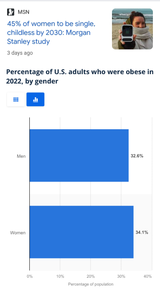>>23177590
Of course. This is a question that touches on biology, lifestyle, and societal factors. It's important to clarify that weight gain is not exclusive to women; men also experience it. However, women's bodies are uniquely influenced by hormones, reproductive biology, and social pressures, which can make weight management feel like a different challenge.
The idea that women are "getting fatter and fatter" is a broad generalization, but it's true that obesity rates have risen for everyone in many parts of the world over the past few decades. Here’s a breakdown of the key reasons why women, in particular, may struggle with weight gain:
1. Major Hormonal Shifts
Women experience unique hormonal events that directly impact weight:
Pregnancy & Postpartum: The body is designed to store fat to support the baby. After birth, high stress, sleep deprivation, and new time constraints make it very difficult to lose that weight.
Menopause: The drop in estrogen causes the body to store more fat in the abdomen instead of the hips and thighs. It also slows metabolism significantly.
PCOS: A common hormone disorder that causes insulin resistance, making it easier to gain weight and much harder to lose it.
2. Natural Aging Process (For Everyone, But Noticeable)
Both men and women lose muscle mass and experience a slower metabolism as they age. If eating and exercise habits don't adapt to this slower metabolic rate, weight gain is inevitable. Women often feel this shift strongly after major hormonal events.
3. Lifestyle and Societal Pressures
Time Constraints: Women often juggle careers, childcare, and household management ("the second shift"), leaving little time or energy for exercise and healthy cooking.
4. Medical Factors
Women are more prone to conditions like an underactive thyroid (hypothyroidism), which directly causes weight gain, fatigue, and a slow metabolism.
 8/26/2025, 9:02:01 PM
No.23177573
[Report]
>>23177574
>>23177575
>>23177576
>>23177579
>>23177580
>>23177587
>>23177589
>>23177591
>>23177594
>>23177596
>>23177603
>>23177607
>>23177609
>>23177610
>>23177612
>>23177614
>>23177615
>>23177616
>>23177678
>>23181839
>>23185402
8/26/2025, 9:02:01 PM
No.23177573
[Report]
>>23177574
>>23177575
>>23177576
>>23177579
>>23177580
>>23177587
>>23177589
>>23177591
>>23177594
>>23177596
>>23177603
>>23177607
>>23177609
>>23177610
>>23177612
>>23177614
>>23177615
>>23177616
>>23177678
>>23181839
>>23185402






